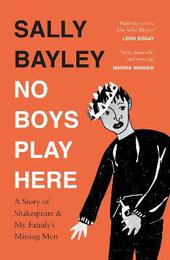
|
No Boys Play Here: A Story of Shakespeare and My Family's Missing Men
Paperback / softback
Main Details
| Title |
No Boys Play Here: A Story of Shakespeare and My Family's Missing Men
|
| Authors and Contributors |
By (author) Sally Bayley
|
| Physical Properties |
| Format:Paperback / softback | | Pages:272 | | Dimensions(mm): Height 198,Width 129 |
|
| Category/Genre | Memoirs
Modern and contemporary fiction (post c 1945) |
|---|
| ISBN/Barcode |
9780008318925
|
| Classifications | Dewey:942.26 |
|---|
| Audience | |
|---|
|
Publishing Details |
| Publisher |
HarperCollins Publishers
|
| Imprint |
William Collins
|
| Publication Date |
20 January 2022 |
| Publication Country |
United Kingdom
|
Description
'Nobody writes like Sally Bayley' Lemn Sissay From the brilliantly original and critically acclaimed Sally Bayley, a literary story of working class childhood, absent or broken men and the power of literature to save and rebuild a world. In Sally Bayley's childhood, the men were often missing. Missing because they were drunk, or out of work, or wandering. Or missing because their behaviour meant women banned them from the house. The man who was around for Sally was Shakespeare, and he brought men with him to fill the gaps. Sally grew up with a troupe of sad kings and lonely heroes. Her mind ran away from home with Falstaff and Prince Hal, with deceivers and mavericks and geniuses. In her signature and extraordinary style, this is Sally's story of her childhood - one lived with darkness snapping at heels, with real and imagined people passing through interchangeably, and with trauma a spiky memory to be skirted and avoided. Inventive, literary and adventurous, this is a story of hard childhood and a testament to the way that great literature and its characters can guard an imagination against the bad.
Author Biography
Sally Bayley is a Teaching and Research Fellow at the Rothermere American Institute at the University of Oxford and from September 2018 she will be teaching writing in Oxford as a Royal Literary Fund Fellow. Sally has written widely on visual responses to literature, including a jointly authored study of Sylvia Plath's relationship to the visual arts: Eye Rhymes: Sylvia Plath's Art of the Visual and a study of Plath as a cultural icon: Representing Sylvia Plath. In 2010 she completed a cross-media study of Emily Dickinson as a way of thinking about America's relationship to space and place: Home on the Horizon: America's Search for Space, from Emily Dickinson to Bob Dylan. She is the author of The Private Life of the Diary (Unbound, 2016).
Reviews'Nobody writes like Sally Bayley' Lemn Sissay 'Bayley's second volume of memoir is as original and moving as the first. Shakespeare's characters walk with a family enacting their own tragedies and comedies as they struggle with poverty and illness. Bayley's bright, tight, sentences and tender wit create a truly child-like perspective which allows us to understand great pain. To be read by all educationalists' Kate Clanchy 'An extended soliloquy, requiring and amply repaying an exercise of the reader's imagination ... Bayley's prose style, freely associative, cryptically allusive, evocatively resonant has affinities with (Dylan Thomas)' Stanley Wells, TLS 'Very powerful and moving ... With many insights into aspects of the way we live now' Marina Warner 'Dances along the intersections of memoir, family history, literary criticism and autofiction ... Her writing is always fluid, playful, surprising and challenging. Ultimately, this is a book about healing, about how the characters of literature can help us re imagine and redeem the challenging people we encounter in our own lives' Alice Jolly 'No Boys Play Here glitters ... It's a truism that reading shapes the way we see ourselves in the world, but this is something richer and stranger: it enabled Bayley to rescue and recreate herself. Someone should make a play of it' Guardian 'No Boys Play Here zips by, its coming of age tale revealed in memorable scenes ... Bayley's writing flows with wit and clarity' Irish Examiner 'We follow Bayley from her early childhood in a house ruled by women to the time when, aged fourteen, she gave herself up for adoption, in the face of enraged opposition from her aunt ... Bayley's adeptness with mobile identities, with class as well as gender, gives her unexpected sympathies' London Review of Books 'She writes with deliberately elusive lyricism, like all the best lines in a favourite song' Oxford Review of Books
|